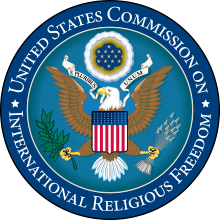

USCIRF Releases New Report About Entities Of Particular Concern And Religious Freedom
FeaturedPress Releases November 8, 2021 admin

Washington, DC – The United States Commission on International Religious Freedom (USCIRF) today released the following new report on the international standards that impose obligations on Entities of Particular Concern (EPCs) to respect the freedom of religion or belief (FoRB):
EPCs and Religious Freedom Factsheet: – Some of the gravest threats to FoRB in recent years have come not from government actions, but from non-state actors. In recognition of this threat, the Frank R. Wolf International Religious Freedom Act of 2016, which amended the International Religious Freedom Act (IRFA) of 1998, created a new presidential designation for EPCs, for non-state actors that engage in particularly severe violations of religious freedom and meet certain other criteria. This factsheet explores the international standards that impose human rights obligations on EPCs and other armed non-state actors to respect FoRB. It also considers the responsibilities of EPCs to protect religious communities under international humanitarian and criminal law. A better understanding of the international law principles on the responsibilities of EPCs can help the U.S. government and international partners better respond to violations perpetrated by EPCs, promote the necessity of the protection of religious freedom by non-state actors, and ensure accountability for violations committed by these groups.
In its 2021 Annual Report, USCIRF recommended that the U.S. State Department designate al-Shabaab, Boko Haram, Hay’at Tahrir al-Sham (HTS), the Houthis, Islamic State in the Greater Sahara (ISGS), Jamaat Nasr al-Islam wal Muslimin (JNIM), and the Taliban as EPCs. In September 2021, USCIRF released a country update on Yemen, which details the alarming trends of increased Houthi persecution against Baha’is, Christians, and Jews. In 2021, USCIRF also released a factsheet on violent Islamist groups in Northern Nigeria, which details religious freedom violations committed by Boko Haram and Islamic State in West Africa Province, as well as a factsheet on Islamists in Central Sahel, which examines Islamic State and al-Qaeda affiliated armed groups in that region.

